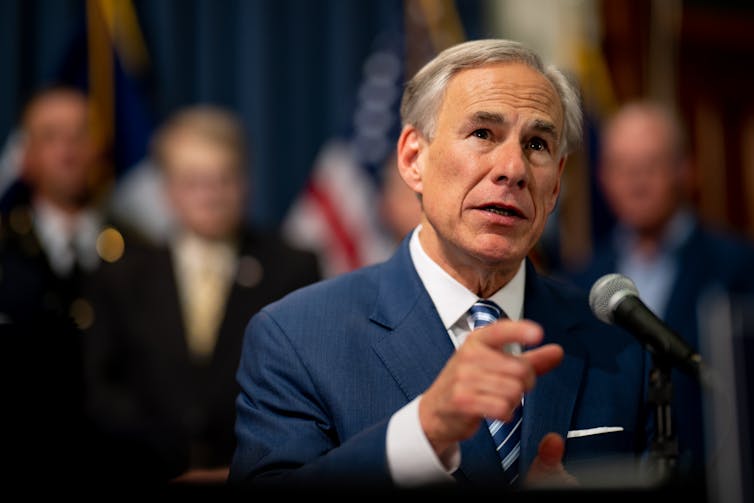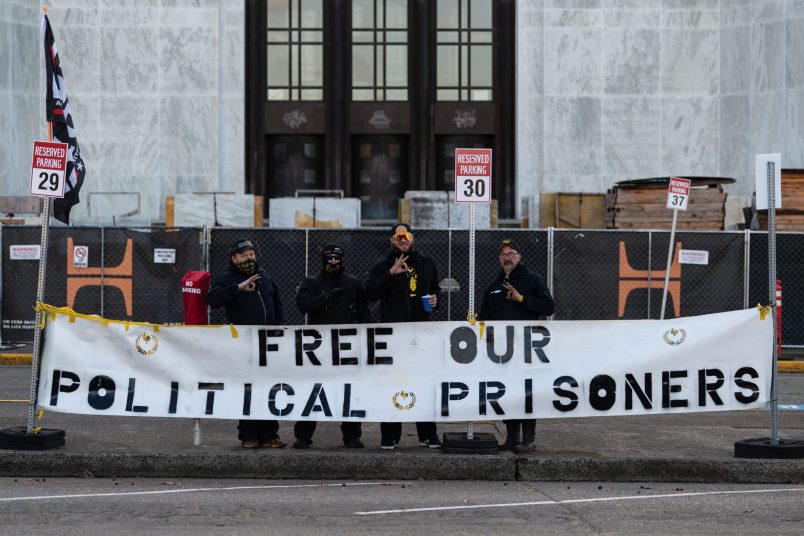This article is part of TPM Cafe, TPM’s home for opinion and news analysis. It was originally published at The Conversation.
In the past 10 years, there has been an increase in far-right political violence in the United States. While scholars have pointed to several possible reasons – and often, combinations of explanations – the trend is clear.
This violence has coincided with the growing influence of far-right state and federal political candidates, who collectively have excited and mobilized extremist communities both online and in person.
In response, federal and state law enforcement officials have focused increasing attention on these movements with the hope of deterring political violence and lowering the risk of domestic extremism. Many who participated in political violence – including Cesar Sayoc, who sent pipe bombs to Democratic officials, Oath Keepers founder Stewart Rhodes and Proud Boys leader Enrique Tarrio – have faced arrest, prosecution and, in some cases, jail or prison sentences.
At the same time, a number of conservative elected officials and politicians have publicly expressed interest in pardoning some of these same people. I am a scholar who studies the individuals, groups and movements that use political violence. Research shows that this use of the pardon power can damage the rule of law in the United States. It undermines one of the tools against violence that law enforcement can bring to bear – deterrence.
The American Bar Association describes the rule of law as a foundational principle for the U.S. justice system: “No one is above the law, everyone is treated equally under the law, everyone is held accountable to the same laws, there are clear and fair processes for enforcing laws, there is an independent judiciary, and human rights are guaranteed for all.”

Diminishing deterrence
In a recent CNN town hall, former President Donald Trump said that if reelected, he is interested in pardoning the recently convicted leadership of the Proud Boys and others who took part in the Jan. 6, 2021, insurrection at the U.S. Capitol.
This is not the first time that Trump has suggested he is considering such an offer. When he was president, he did pardon anti-government extremists.
The pardon power is not limited to a sitting president, however; state governors can issue pardons for state crimes. And some have expressed similar interest in pardoning those convicted of politically motivated criminal acts in recent years.
Texas Gov. Greg Abbott has said he intends to pardon the Army veteran who was recently convicted of killing a Black Lives Matter protester and was sentenced to 25 years in prison.
In August 2021, Missouri Gov. Mike Parson pardoned the couple convicted of gun charges associated with brandishing firearms at protesters during the racial justice marches over the summer of 2020.
Together, these public statements about, and the use of, pardons for politically motivated crime undercut the ability of law enforcement and the intelligence community to deter domestic political extremism.
At its simplest, deterrence means that when people consider whether to do something wrong or illegal, they think about the consequences that they, and others, face or have faced.
When punishment is certain, closer in time to the criminal behavior and proportionally severe, people will be less likely to commit crimes. Research in criminology has shown that of these three aspects, increasing the certainty of punishment can lower the incidence of crime. This is important, because when a pardon is offered, the certainty of punishment is dramatically diminished – lowering the potential deterrent. https://www.youtube.com/embed/O8k_e1E3Xc0?wmode=transparent&start=0 Missouri Gov. Mike Parson pardoned this couple, convicted of gun charges associated with brandishing firearms at protesters during the racial justice marches over the summer of 2020.
Criminal sanctuary
Since Jan. 6, 2021, over 1,000 of the people who participated in the attack on the U.S. Capitol have been criminally charged.
Of these, more than 500 have pleaded guilty, and the Department of Justice has secured convictions in all but one trial.
In other circumstances, the legal consequences could be expected to deter others from political violence in the U.S. However, when politicians signal that those responsible for or guilty of violence aligned with their interests could be shielded from punishment – as shown by the use of pardons – punishment seems less likely. This message of criminal sanctuary – relief from punishment – is what former President Trump, Gov. Abbott and Gov. Parson are communicating.
Recent research draws a direct connection between criminal sanctuary and political violence. “When people perceive that they will be provided sanctuary for their criminal actions … this too leads to crime,” write scholars Laura Dugan and Daren Fisher.
In my research, I look at how these signals of criminal sanctuary by politicians and elected officials are interpreted and acted upon by far-right online communities in the United States.
In a series of recent studies, my co-authors and I looked at what members of far-right online communities talked about and how it changed from before the November 2020 U.S. presidential election through the Jan. 6, 2021, attack on the Capitol.
Over the three-month period, when compared with mainstream online communities, far-right communities, most of them accepting of political violence, shifted their focus from discussions of disinformation around the election to specifically advocating for anti-government violence and civil war.
We looked at how far-right online communities responded when then-President Trump called on his supporters in a tweet to come to Washington, D.C., on Jan. 6, saying it “will be wild!” These users listened to the then president and responded with a sentiment of self-righteousness and a greater focus on the idea that they were acting as soldiers on behalf of Trump.
Consequently, members of those online communities played an important role in the Jan. 6 attack on the Capitol.
In fact, the bipartisan House committee investigating the attack highlighted former President Trump’s “will be wild” tweet as a call to action for his supporters and a signal that their actions on his behalf wouldn’t result in legal consequences.
Despite the “tough on crime” stances taken by many conservative politicians, the use of pardons to offer criminal sanctuary likely undermines the rule of law and increases the risks of political violence.
This article is republished from The Conversation under a Creative Commons license. Read the original article.







Performative bullshit piled on the usual reich-wing bullshit, where can it lead? Where it always does, an ever higher Bullshit Mountain from which it becomes increasingly difficult to return.
^ this is from the Wiki. I’m not sure with MO’s term limits if Parson can run again for governor in 2024, or if filling out Greiten’s term counts for or against a person only serving two terms as governor. The law states he can only serve 8 years, in a 12 year period.
I bring this up because don’t politicians with pardoning power not advertise in advance who they would pardon?
Trump To Room Full Of Christians: ‘I’m Being Indicted For You’ | Crooks and Liars
While speaking at a Christian event to whip up support from his evangelical base, Trump tried to claim that he was being persecuted, but he was doing it for them. “I’m being indicted for you,” said the twice-indicted former President recently found liable for sexual abuse.
Simple, he was indited for your sins
Violence, conducted in the name of right-wing ideology is apparently justified and always OK. Violence in the name of civil and reproductive rights is un-American, and is apparently worthy of death. So say the coo-coo clucks.
May he suffer the same fate.